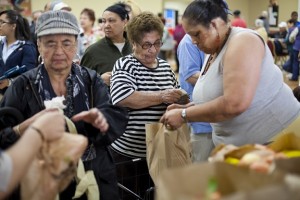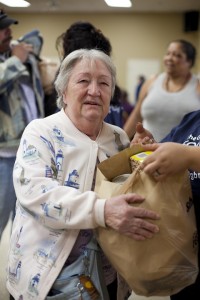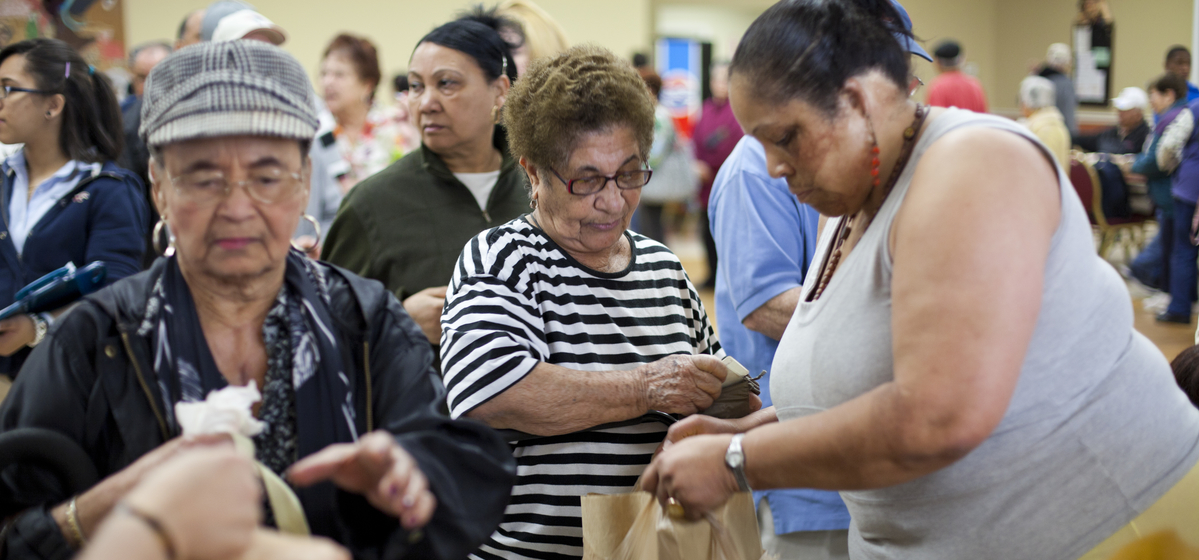Nearly nine million seniors in the United States face the threat of hunger, an increase of 88 percent over a decade’s time. And, according to the national hunger-relief organization Feeding America, the number of food insecure seniors will increase by 50 percent when the youngest of the Baby Boom Generation reaches age 60 in 2025. Hunger is caused by a number of factors, including poverty, but also other issues such as transportation, social isolation, limited mobility and health problems which hinder an older adult’s ability to purchase and prepare nutritious meals.
Here’s a snapshot of what two Massachusetts food banks – the Greater Boston Food Bank and Merrimack Valley Food Bank are doing to help end elder hunger.

Photo courtesy of Jessie Gladin-Kramer, Feeding America
Greater Boston Food Bank
In September 2013, the Greater Boston Food Bank surpassed an historic milestone by distributing a collective half a billion pounds of food over its 32-year history. The Greater Boston Food Bank is the first food bank in the New England region to reach the half-billion pound mark, which equates to 417 million meals.
This milestone, while an accomplishment, reflects the tremendous need for hunger assistance in eastern Massachusetts, where, according to Feeding America’s 2010 Hunger In America study, as many as one in nine residents is food insecure. In recent years, the Greater Boston Food Bank is seeing more middle class families turning to hunger relief agencies for help.
“Many seniors live on a fixed income and are finding it increasingly difficult to afford food as housing and living costs rise in eastern Massachusetts,” said Catherine D’Amato, president and CEO of the Greater Boston Food Bank. “As we approach the winter months and higher heating bills, this struggle becomes even greater. Our Brown Bag program helps seniors at risk of hunger manage their finances and stay healthy by providing supplemental, nutritious groceries. We provide high nutrient and high protein groceries to 8,438 seniors in 14 communities every month to help them keep up with bills and remain active and healthy.”
Merrimack Valley Food Bank
 The Merrimack Valley Food Bank’s Mobile Pantry Program helps homebound low-income elderly and disabled individuals in the Greater Lowell area maintain their health by delivering groceries once a month to about 400 individuals. Since many of the Mobile Pantry clients have dietary restrictions, staff and volunteers customize each food bag based on the client’s individual food preferences and health specifications. Volunteers contribute more than 3,000 hours annually to help Mobile Pantry clients; their assistance is essential to not only sorting, bagging and delivering groceries but also checking in on clients for any changes that may impact their health.
The Merrimack Valley Food Bank’s Mobile Pantry Program helps homebound low-income elderly and disabled individuals in the Greater Lowell area maintain their health by delivering groceries once a month to about 400 individuals. Since many of the Mobile Pantry clients have dietary restrictions, staff and volunteers customize each food bag based on the client’s individual food preferences and health specifications. Volunteers contribute more than 3,000 hours annually to help Mobile Pantry clients; their assistance is essential to not only sorting, bagging and delivering groceries but also checking in on clients for any changes that may impact their health.
“Our Mobile Pantry volunteers are valuable assets to our program as well as to the clients they deliver groceries to monthly,” said Amy Pessia, executive director of the Merrimack Valley Food Bank. “Our dedicated volunteers share an interest in our mission and act as a liaison between our Mobile Pantry program and the community to help meet the health and nutritional needs of the elderly and disabled individuals living in the Greater Lowell area. The bonds that are formed between our volunteers and clients offer us insight into the client’s home life which enables us to monitor their health and personal needs.”
This story was published originally in the Tufts Health Plan Foundation’s November 2013 newsletter.

